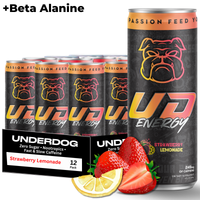We get it, got to test the 'waters'.
Grab a sample pack - usually $24.99
Just $22.49

When it comes to energy drinks, sweetness matters. It’s what balances the tangy flavors, masks caffeine bitterness, and creates that satisfying finish. But not all sweetness is created equal.
At Underdog Energy, we’ve made a deliberate choice to use natural sweeteners — like stevia, monk fruit, and erythritol — instead of artificial options like sucralose or acesulfame potassium (Ace-K).
Here’s why that decision matters — and how natural sweeteners compare to artificial ones in energy drinks.
The Rise of Natural Sweeteners in Energy Drinks
Consumers are becoming increasingly label-conscious. They want performance without compromise — clean energy without artificial chemicals. That’s why natural sweeteners are transforming the beverage industry.
Stevia: The Herbal Powerhouse
Derived from the leaves of Stevia rebaudiana, stevia’s sweetness comes from steviol glycosides. It’s naturally zero-calorie, has no carbohydrates, and doesn’t raise blood sugar. However, some people notice a slightly bitter or licorice-like aftertaste when stevia is used on its own.
Monk Fruit: Sweetness from Nature
Monk fruit gets its sweetness from mogrosides, natural antioxidants extracted from the fruit. It’s calorie-free, doesn’t spike blood sugar, and is one of the cleanest-tasting natural sweeteners available. Because it’s hundreds of times sweeter than sugar, it’s used in very small amounts.
Erythritol: The Balancing Act
Erythritol is a naturally occurring sugar alcohol found in fruits like pears and grapes. It provides sweetness with virtually no calories because most of it passes through the body undigested. It’s often used to balance the flavor profile of stevia and monk fruit, adding smoothness and reducing any herbal aftertaste.
Artificial Sweeteners: The Industry Standard (for Now)
Many mainstream energy drinks use sucralose and acesulfame potassium (often listed as “Ace-K”) because they’re cheap, shelf-stable, and highly potent.
Sucralose
Sucralose is a chemically modified form of sugar, about 600 times sweeter than sucrose. It’s calorie-free because it passes through the digestive system mostly unchanged. While it provides a clean sweetness, it’s synthetically made — and some research suggests it may alter gut bacteria or affect glucose metabolism over time.
Acesulfame Potassium (Ace-K)
Ace-K is often paired with sucralose to round out flavor profiles. It’s heat-stable and inexpensive, but also artificial. Studies continue to evaluate its long-term metabolic and gut health effects, and many consumers simply prefer to avoid it.
Natural vs. Artificial Sweeteners: What’s the Real Difference?
Both natural and artificial sweeteners can make a drink taste good without sugar, but the source, body response, and perception are what set them apart.
1. Source and Processing
-
Natural sweeteners come from plants — stevia leaves, monk fruit, and fermented sources like erythritol.
-
Artificial sweeteners are chemically synthesized in labs.
While both are technically “non-nutritive” (meaning they add little or no calories), consumers increasingly prefer ingredients they can recognize and pronounce.
2. Metabolic and Gut Health
Natural sweeteners like stevia and monk fruit have minimal impact on blood sugar or insulin response. Artificial sweeteners such as sucralose have been studied for potential effects on gut microbiota — some evidence suggests changes in bacterial balance with long-term use.
For those focused on metabolic health, natural sweeteners are often the safer bet.
3. Taste and Aftertaste
Artificial sweeteners like sucralose are known for a “clean” sugar-like sweetness, but at higher concentrations, they can taste slightly chemical-like. Stevia and monk fruit are naturally potent but can have herbal notes if used alone. Blending them with erythritol helps deliver a smoother, sugar-like taste — which is exactly what we do at Underdog Energy.
4. Perception and Brand Transparency
Clean labels and transparent ingredients are now driving consumer loyalty. “Naturally sweetened” doesn’t just sound better — it is better aligned with how people want to fuel their performance.
Why Underdog Energy Uses Natural Sweeteners
We created Underdog Energy with one goal: to deliver clean, consistent energy and performance without compromise. That means no sugar, no artificial chemicals, and no shortcuts.
Here’s why we chose natural sweeteners:
-
They align with our clean-performance promise. Athletes and everyday heroes deserve energy they can trust — not synthetic chemicals.
-
They support balanced, sustained energy. Natural ingredients complement our time-released caffeine and functional nootropics for a smoother experience.
-
They fit today’s “better-for-you” movement. People want to know what’s in their drinks. We’re proud to say every ingredient has a purpose — and a natural origin.
-
They help us stand out. In an industry flooded with sucralose-based options, our natural formula makes us different — and better.
The Bottom Line
When you crack open a can of Underdog Energy, you’re getting more than a boost — you’re making a choice. A choice to fuel your body naturally.
While sucralose and artificial sweeteners have long dominated the market, the future of energy belongs to clean, transparent, naturally sweetened options that support performance without compromise.
That’s what we stand for at Underdog Energy — real energy, built the right way.
References
Food Insight. (2023). Everything You Need to Know About Monk Fruit Sweeteners. Retrieved from https://foodinsight.org/everything-you-need-to-know-about-monk-fruit-sweeteners
Mayo Clinic. (2023). Artificial sweeteners and other sugar substitutes. Retrieved from https://www.mayoclinic.org/healthy-lifestyle/nutrition-and-healthy-eating/in-depth/artificial-sweeteners/art-20046936
Verywell Fit. (2024). Sucralose vs. Stevia: Which Is Healthier? Retrieved from https://www.verywellfit.com/sucralose-vs-stevia-8607329
Verywell Health. (2023). Is Erythritol a Safe and Healthy Sugar Substitute? Retrieved from https://www.verywellhealth.com/erythritol-7488082
National Institutes of Health (PMC). (2023). Effects of Sucralose Consumption on the Gut Microbiome. Retrieved from https://pmc.ncbi.nlm.nih.gov/articles/PMC10971371/




















